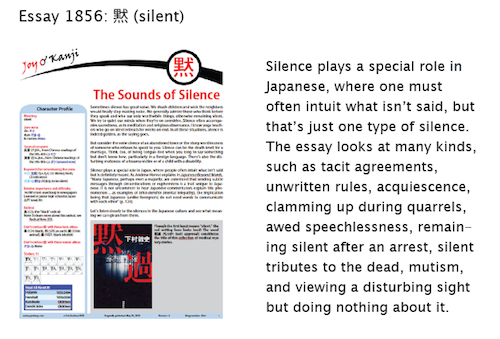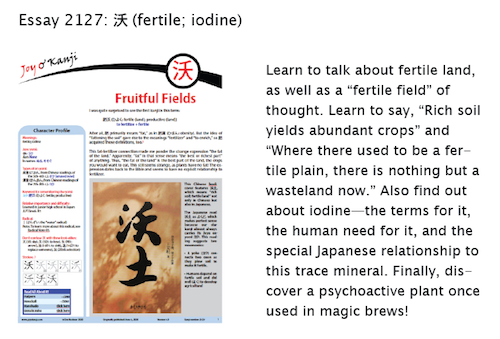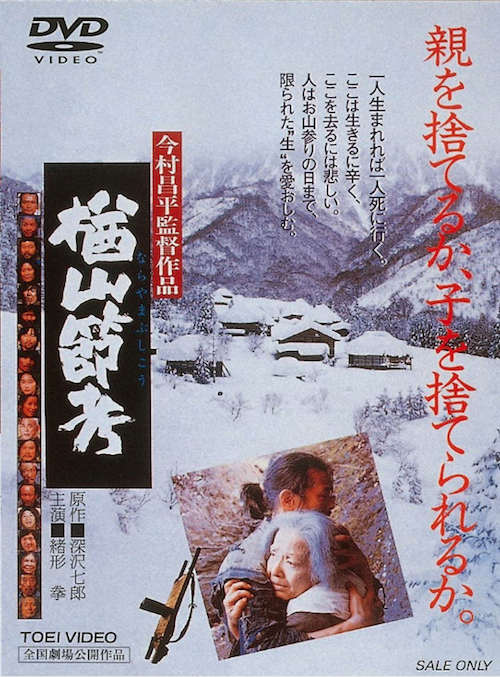What We Need, What We Throw Away
If you saw this word, what would you think it meant:
不可欠 (ふかけつ) not + -able + lack
a. disability
b. lack of talent; incompetence
c. indispensable
d. dispensable
I'll block the answer with a preview of the two newest essays, 1856 on 黙 (silent) and 2127 on 沃 (fertile; iodine):
On seeing the negating prefix 不-, I assumed 可欠 was a word, but it's not (just as "distraught" exists whereas "traught" does not!).
I found 不可欠 in essay 2127 in a sentence featuring 肥沃 (ひよく: fertile (land)):
良い収穫を得る為には、肥沃な土壌が不可欠だ。
Fertile soil is indispensable for a good harvest.
良い (よい: good); 収穫 (しゅうかく: harvest);
得る (える: to get); 為 (ため: for); 土壌 (どじょう: soil)
As it happens, the essay touches on another indispensable item—namely, the trace mineral iodine. I've learned that "trace mineral" means "an element required in minute quantities for physiological functioning." Iodine is a trace mineral; in writing this essay, I discovered (and reported) ways in which human bodies depend on iodine, as well as the foods that supply it. If you read the essay for no other reason, read it for that information; I hate to think I've gone so many years without knowing about this vital aspect of health. Now I'm inspired to eat seaweed, as that's a great source of iodine. Because the Japanese diet has traditionally included so much kelp, the Japanese consume far more iodine than most people in the world. I've heard many theories explaining Japanese longevity, but I've never heard anyone connect those dots. Could there be a link between iodine and long lifespans? Am I way out of my element with such speculation? Probably!
Speaking of lifespans, we've heard repeatedly that the coronavirus takes the greatest toll on the elderly, which has prompted some U.S. politicians to make callous comments about reopening the economy at the expense of the aged—essentially letting them take one for the team.
It surprised me just now to come across something I jotted down in 2012 or so:
棄老 (きろう: old person thrown away in the mountains) to abandon + old person
I started writing a blog post about 棄老 way back then, but the topic seemed strange and disconcerting, as well as irrelevant to normal life, so I abandoned it
How times have changed. Everything is unpleasant now, practically all the time, only to be replaced by something even worse. First the pandemic swept around the world. And then in the last two weeks, after yet another instance of lethal police brutality against a black man, it has become apparent that it's not just the elderly whose lives hang in the balance. In the United States, large swaths of the black community are treated as if they don't matter—as if we can just throw them away with impunity.
Somehow it feels right now to return to the word 棄老.
Two Japanese friends told me that this term alludes to a specific mountain, one called 姥捨山 (うばすてやま or おばすてやま: aunt + to throw away + mountain), where the non-Joyo 姥 means "old woman." As legend has it, a man had to leave his aunt (who was also his foster mother) on that very mountain.
These friends said that although they grew up hearing this story, they were never sure if it was a matter of history or just a legend. My proofreader concurs, commenting, "It could actually have happened in situations of extreme poverty, but people unquestionably don't want to talk about it as real."
The 1983 movie「楢山節考 (ならやまぶしこう: The Ballad of Narayama」, which was based on a 1954 Shichiro Fukazawa novel of the same title and a 1958 film directed by Keisuke Kinoshita, depicts this type of abandonment, though the protagonist of the 1983 movie ditches his mother, not his aunt. Here's the DVD cover:
The red words down the right are as follows:
親を捨てるか、子を捨てられるか。
Are you abandoning your parent? Can you abandon (your role as) a child?
親 (おや: parent); 捨てる* (すてる: to abandon); 子 (こ: child)
In the second clause, the verb 捨てる appears in its potential form. The を has been used here rather than が because the entire 子を捨てる phrase has been made into the potential form.
The smaller black writing to the left explains the dilemma a bit more:
一人生まれれば一人死に行く。
When one person is born, one person needs to die (because of limited food in the village).
一人* (ひとり: one person); 生まれる (うまれる: to be born); 死に行く (しにゆく: to die)
ここは生きるに辛く、ここを去るには悲しい。
This is a difficult place to live, and it's sad to leave this place.
生きる (いきる: to live); 辛い (つらい: difficult); 去る (さる: to leave);
悲しい (かなしい: sad)
人はお山参りの日まで、限られた"生”を愛おしむ。
People appreciate their limited lives until the day they visit the mountain (where they’re left to die).
人 (ひと: person); お山参り (おやままいり: visiting a mountain); 日 (ひ: day); 限る (かぎる: to be limited to, shown here in the past tense of its passive voice); 生 (せい: life); 愛おしむ (いとおしむ: to cherish)
Here's how Wikipedia summarizes the plot:
The film is set in a small rural village in Japan in the 19th century. According to tradition, once a person reaches the age of 70 he or she must travel to a remote mountain to die of starvation, a practice known as ubasute. The story concerns Orin, who is 69 and of sound health, but notes that a neighbor had to drag his father to the mountain, so she resolves to avoid clinging to life beyond her term. She spends a year arranging all the affairs of her family and village: she severely punishes a family who are hoarding food, and helps her younger son lose his virginity.
Hmm, that last bit sounds more a little creepy!
The highlighted "ubasute" is linked to a page entirely about 姥捨 (うばすて: abandoning an old woman). The article shows how 姥捨 has left its mark on Japanese folklore, poems, and koans. And it says this: "The characters of Christopher Buckley's 2007 novel Boomsday introduce the concept of 'Ubasute' as a political ploy to stave off the insolvency of social security as more and more of the aging US population reaches retirement age, angering the Religious Right and Baby Boomers."
Apparently, people in the United States have been talking about this topic for far longer than I realized. So that's three things I've learned about: trace minerals, iodine, and "senicide" (killing or abandoning the elderly). Oh, and I picked up some kanji along the way!
Catch you back here next time!
❖❖❖
Did you like this post? Express your love by supporting Joy o' Kanji on Patreon:





Comments